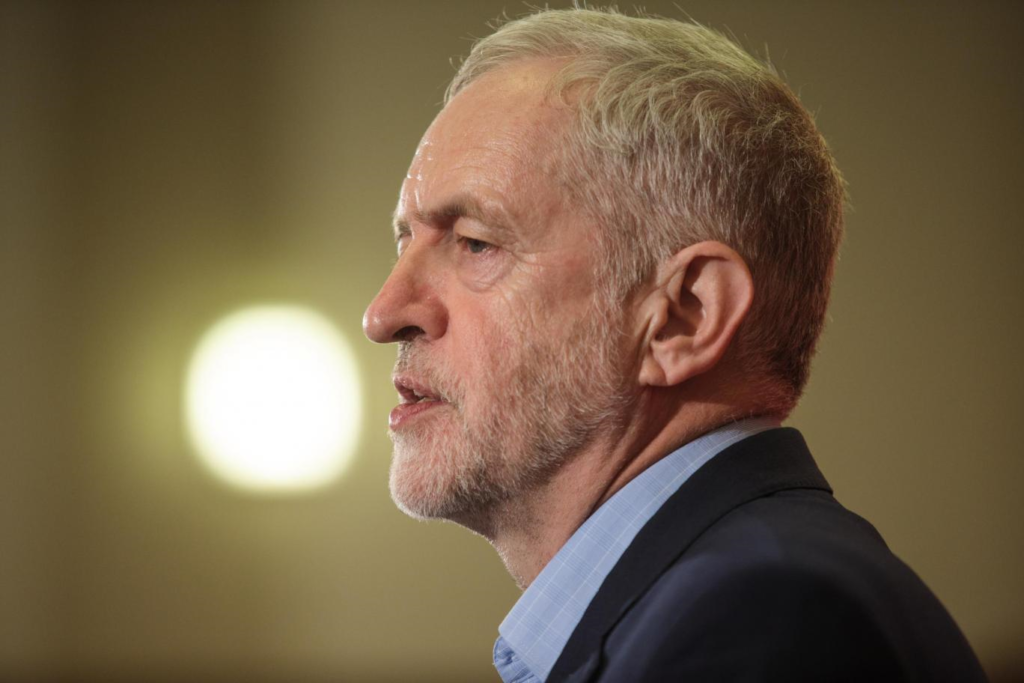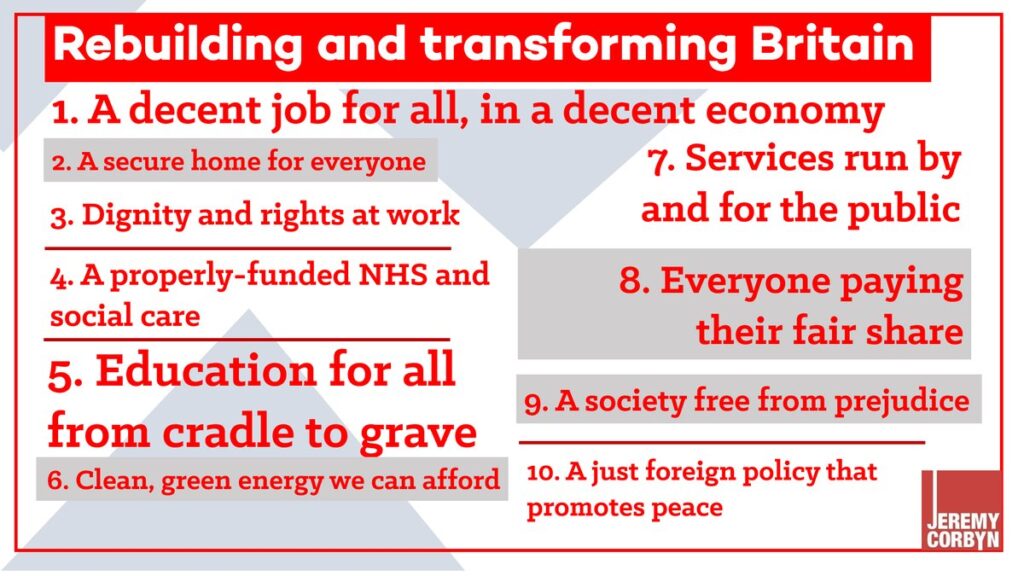Fabian doomsayer’s analysis of Labour is twaddle, designed to demoralise new members

The Independent‘s caption for this picture reads: “A little over half of Labour’s 2015 voters say they now support the party led by Jeremy Corbyn”. Gosh. And how many people who didn’t vote Labour now support the party? How many who didn’t vote at all, because the couldn’t support any of the right-wing parties (including Labour at the time) that were on the ballot paper? [Image: Getty].
His ‘research’ (if you can call it that) is riddled with false assumptions. In opposition, allow me to offer you this:
Get the picture now?
If you read his piece on the Fabian website, you can drive a truck through the holes in Mr Harrop’s logic.
“The Corbynite left has won the big internal battles but it seems to have no roadmap for winning back lost voters.” And which “lost voters” are these? The Liberal Democrat or Tory voters who had been temporarily won by the silly ‘triangulation’ policies of Blair, Brown and, to an extent, Miliband, that forced nearly five million voters from Labour’s natural constituency out the door? They were never truly Labour voters.
“On Brexit, the greatest political question for two generations, the party’s position is muffled and inconsistent.” Isn’t that because, with a “muffled and inconsistent” position from the Conservatives, there is nothing for Her Majesty’s Opposition to, you know, oppose?
Seriously, Labour did set out a consistent position. Unfortunately, right-wing Labour MPs with their own agenda seem to have taken delight in trying to confuse the electorate about the party’s attitude – with the help of a salivating press that relishes any opportunity to put Labour out of reckoning, especially when the Conservatives are in such poor shape. Keir Starmer has done the party no good at all by speaking out in public without having discussed matters in private.
“Labour remains strong in urban pockets but is faring very badly in by-elections.” This is a flat lie. Labour has been recording double-figure increases in voter percentages at by-elections. Sure, there have been some losses; that’s democracy – you don’t win every seat.
“If the opinion polls are any guide, it could soon cease to be a nationally competitive political force.” The opinion polls aren’t any guide, though. They’ve been consistently wrong for nearly two years.
“In Scotland there is no sign of recovery.” Scottish Labour has a right-winger – Kezia Dugdale – as leader. She is a huge liability, an obstacle to a left-wing Labour resurgence.
“The real threat in marginal seats is that former Labour supporters will scatter in all directions, while the Tories reach out to everyone who voted Leave.” It is misleading to refer only to “former Labour supporters”. If they are “former” supporters because they don’t like the party now, then they were never really Labour supporters at all. And what about people who didn’t support Labour in the last few elections but have returned to the party now? What about those who haven’t been voting at all, because they couldn’t support any of the right-wing parties (including Labour at the time) who were on the ballot paper? Is Mr Harrop ignoring them because they’ll mess up his propaganda piece?
As for Tories chasing “everyone who voted Leave”, perhaps Mr Harrop hasn’t noticed, but far fewer people would vote Leave again if the referendum was re-run, because they have realised that the Leave campaign fed the British public nothing but a series of lies from beginning to end. And has he forgotten that a significant proportion of Tories also voted Remain? Some might stay out of (misplaced) loyalty, but many may be put off by a party that is turning its back on them (if his claim about Tory policy is accurate).
“The Liberal Democrats now have their sights on the party’s 5 million remainers, and in the recent by-elections they’ve won plenty over.” This may be the only relevant point in Harrop’s entire piece. Yes. The Liberal Democrats are enjoying a resurgence – and Labour isn’t doing its job in response. The response is to point out that the Liberal Democrats are a right-wing party that allied with the Tories for five years and pushed through policies that were hugely harmful to the general population of the UK.
Anybody who votes for a Liberal Democrat, based on the party’s position on Brexit, is voting for a lie. The Liberal Democrats cannot affect the UK’s membership of the European Union – but they will happily ally with the Tories again if they get the chance. Tim Farron has said as much.
“To find a way back, Labour must therefore become the party of this cultural ‘middle’.” This is plain – Mr Harrop is advocating a return to the Blairite ‘triangulation’ that reduced Labour to the hollowed-out shell that lost the 2015 general election so badly.
Mr Harrop is completely wrong.
We’re back to Tony Benn’s “weathercocks” and “signposts”. Mr Harrop wants Labour to be a party of “weathercocks”, going any way the wind blows in a desperate bid for votes from people who – according to the assumption – won’t change their opinions. Labour has tried that plan. It is, in the words of Blackadder, “bollocks”.
British politics is at a low ebb and copying other parties is a sure way to self-destruction.
Labour members should be the “signposts” to a new kind of politics. Jeremy Corbyn has clearly expressed his direction of travel. If you need to be reminded, here it is:
Are these words not clear enough?
Sadly, it seems some in the media are keen to give Mr Harrop’s claims a semblance of credibility that they do not deserve.
Look at The Guardian‘s ‘fake news’ piece suggesting John Healey agreed with the Fabian doomsayer. The strapline has it that “John Healey … says report that party could shrink to 150 MPs is ‘warning’”.
Look at what he actually says, further down the piece, and you’ll see that this is an unwarranted misrepresentation. He didn’t support Mr Harrop’s attempt to undermine Jeremy Corbyn’s new direction for Labour. Instead, he pointed out: “Quite rightly, the Fabian Society say the roots of Labour’s problems pre-date Jeremy Corbyn. They were there in the 2015 election and in the 2010 election.”
In other words, he is suggesting the opposite of Mr Harrop’s claims.
Join the Vox Political Facebook page.
If you have appreciated this article, don’t forget to share it using the buttons at the bottom of this page. Politics is about everybody – so let’s try to get everybody involved!
Vox Political needs your help!
If you want to support this site
(but don’t want to give your money to advertisers)
you can make a one-off donation here:
Buy Vox Political books so we can continue
fighting for the facts.
The Livingstone Presumption is now available
in either print or eBook format here:
Health Warning: Government! is now available
in either print or eBook format here:
The first collection, Strong Words and Hard Times,
is still available in either print or eBook format here:













If what you say is true, Mike, and more people are behind the Labour party now than in 2015 – many more according to you – why did Labour do much worse in the Sleaford and Richmond by-elections, dropping one or two places down the rankings and overtaken in both cases by the Liberal Democrats? And why do you think the polls are not showing Labour increasing in popularity if support for the party is growing? This makes no sense to me. Labour is way behind the Conservatives, miles outside the margin of error, in a different way than during the last general election. I am not as sanguine as you in respect to the party’s electoral chances even though Labour’s membership roll have swelled under Jeremy Corbyn’s leadership, which seems powered by a mass of already convinced left-wingers rallying to the flag of somebody who embodies their hopes; from my perspective Labour is signally failing to gather the necessary support from unaffiliated floating voters, who did not vote Labour in 2015, to have any chance of gaining power in 2020.
Labour has gained massive niche appeal under Corbyn but insufficient general appeal to be able to win a majority in a first-past-the-post electoral system – or any electoral system really – as far as I can see.
I didn’t say more people support Labour now than in 2015. Where did I write that? You suggested that, not me. I don’t know whether the party has more supporters or not (although it is certainly true that party membership has tripled). The problem with Mr Harrop’s article is, he does not know the answer to that question either – or he does not wish to reveal it. He concentrates only on those abandoning Labour. From this, we may conclude that his findings are unfairly slanted.
Labour didn’t do “much worse” in the by-elections you mention and it is wrong to make that suggestion. Read my articles on those election results.
The polls don’t show a Labour increase in popularity because they are adjusted to negate any such increase – and they are designed to focus on negative coverage of Labour in the media.
The issue for Labour in 2017 is to silence the sabotage attempts by right-whingers squatting in the Parliamentary party, and to counter the fake news propagated by the right-wing press with a series of plain, clear messages, that can be repeated regularly for reinforcement.
Let’s be clear on this: “A little over half of Labour’s 2015 voters say they now support “the party” led by Jeremy Corbyn”.
This can sound that people cannot support the Party because is it lead by Corbyn.
Whereas I cannot support the party or continue expending my energy, money resources and resilience as it remains so poisonous and opposing to its members, decent ethical people and normal working class people by stabbing them both in the face and back, as they do Corbyn and McDonnell.
We voted and supported Corbyn for change and new politics and end up with old, abusive and stab in the back and front.
Doing it to themselves again, silencing descent, saying all have to support Labour unquestionably, and expelling anyone who does not. Then we have the left who have their own agenda and trapped rail tracks, talking revolution, strikes, bringing the country to a halt and the govt down – who then again alienate anyone.
Done it to themselves again and if Corbyn was anything he says he is, he would put a stop to it and a spoke in the wheels which are going down the same defeatist track as before.
Cannot support Labour as it is. absolutely nasty and horrible again, on both side,s right and left.
You seem to have a blind spot regarding Labour. It is not the party it was, and those responsible for the kind of behaviour you deplore are being isolated and forced out.
You seem determined to tar all of Labour with the same brush. That is hugely unjust.
Been listening to BBC news about this twister of truth Harrop today while clearing up after Christmas and people staying. All day they’ve been spouting claptrap and it hasn’t changed or modified from dawn till dusk! Emailed and tweeted BBC but to no avail. Every week sees another step down the propaganda and lazy journalism route.
Richard Murphy over at Tax Research has been saying Labour are not doing so well, he’s been quoted on this blog a few times.
What is concerning is Labours dwindling support in its supposed strongholds, Working Mens Clubs in the North, I have been in several and Jeremy Corbyn is not flavour of the month, neither is Labour.
A way of finding out whether Labour can win elections is to put a Corbyn supporter in Cumbria and see how they get on.
All this poll evidence is dodgy.Examples on the latest yougov poll on the question who would make the best PM
ALL – 41% don’t know
Under 25’s – 46% don’t know
Social class C2 & DE – 47%don’t know
There are so many don’t knows as to make this statistically meaningless.
What’s more, the main question of voting intention at the next election is affected by weighting on the basis of these almost meaningless polls
I agree.
Grasping at straws there really: Just because people won’t say that they don’t support you doesn’t mean that they might, especially as one out of every three people eligible to vote don’t bother to vote. Unless people actually vote their views will not be represented in the ballot. Anyway, here’s the story about party support in the polls which paints a miserable picture for Labour’s fortunes.
http://ukpollingreport.co.uk
Double digit leads for the Tories pretty much consistently since May became Prime Minister. And the margin of error on these polls is ±4%. Labour trailing in the double digits is HIGHLY significant. While Trump’s victory and the result of the EU referendum were unexpected both results were unlikely outcomes within the margin of error of polling. Labour’s position at present make a Labour victory statistically impossible unless a miracle happens.
Still believing the pollsters, eh, Paul?
The miracle you mention might just be the pollsters correcting their wild assumptions, that are based on out-of-date general election results.